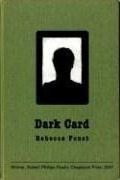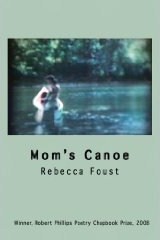Issue 2 - Winter 2010 Reviews Anxious Music Blood Dazzler Cities of Flesh and the Dead Crazy Love Cures and Poisons Dark Card and Mom's Canoe Fire Pond How to Live on Bread and Music Mister Skylight Paternity Perpetual Care Pictures in the Firestorm Rhapsody of the Naked Immigrants Rock Vein Sky Six Lips Slaves to Do These Things Slide Shows The Air around the Butterfly The Guilt Gene the nested object Interviews
 |
Dark Card and Mom’s Canoe by Rebecca Foust share a consummate poetic skill. Both winners of the Robert Phillips Poetry Chapbook Prize in 2007 and 2008 respectively, they examine family. One scrutinizes the role of mother, the other penetrates a daughter’s memory. From the birth of the poet’s autistic son in Dark Card to the death of the poet’s mother in Mom’s Canoe, Foust draws on her craft—the hint of meter and rhyme, alliteration, repetition of words, and the risk of asymmetry—and thereby reveals her angry, compassionate, truth-seeking and affectionate mind. In Dark Card autism is the operative force, as both mother and her son with Asperger’s grow into this reality. The drug DES (diethylstilbestrol) lurks in a past of generationally delayed miscarriages, and Foust in what might be considered generationally delayed rage against the medical industry targets the doctor in “Palace Eunuch.”
Emerging from this birth scene, the poet’s son becomes the poem. We read him, memorize him, recite him, and embrace his lack of guile, which—“face flower-open” —
In “He Never Lies,” the poet expresses her fears of what might happen to her child, who simply cannot lie— “not because he won’t / or doesn’t know better, / or how, he just can’t.”
In the chaos of life, the mother protects her son intensely, admitting that perhaps she doesn’t really “have to whisk / the ice smooth ahead of your / curling stone.” But the maternal urge to protect is tender in its toughness and makes for spellbinding lyrical-narrative poetry. The story could not be told without Foust’s subtlety of craft. Delightful plays with words appear unexpectedly: “like the moon-crazed tide; / it raves like the tide-crazed moon.” The word “dark” in the title suggests an obvious complicated darkness, but also an enlightenment. The “dark card” is the autistic boy’s exceptional intelligence. As caretaker of a child who suffers the cruelty of his peers—“how one time they cornered him / behind the storage shed and stoned him” — this mother is going to point out his brilliance. She is fierce protector, no longer the young carefree girl who “dove from cliffs / into dark quarries.” And quarries, mines, dirty rivers course through Mom’s Canoe. Foust is no less involved in the story she tells here than she was in Dark Card, and she is just as desirous of the truth. But differences abound. Now the poet observes the mother. The casual word “Mom” in the title suggests a lighthearted mother, but a light heart does not figure in these poems. For Foust the ominous Allegheny Mountains of her childhood “calve memory from twilight.” Foust paints her familiar Allegheny mining area with soot, mud, squalid water, wife abuse, and other tokens of desperation and broken dreams. Death is everywhere in a mining place, but it does not destroy. Like Whitman, Foust knows that matter remains. DNA lives on. Memory survives. This is the lovely breadth of her vision. Here it is, in the title poem that delicately evokes “Hiawatha.”
Reviewed by Anne Harding Woodworth. |

